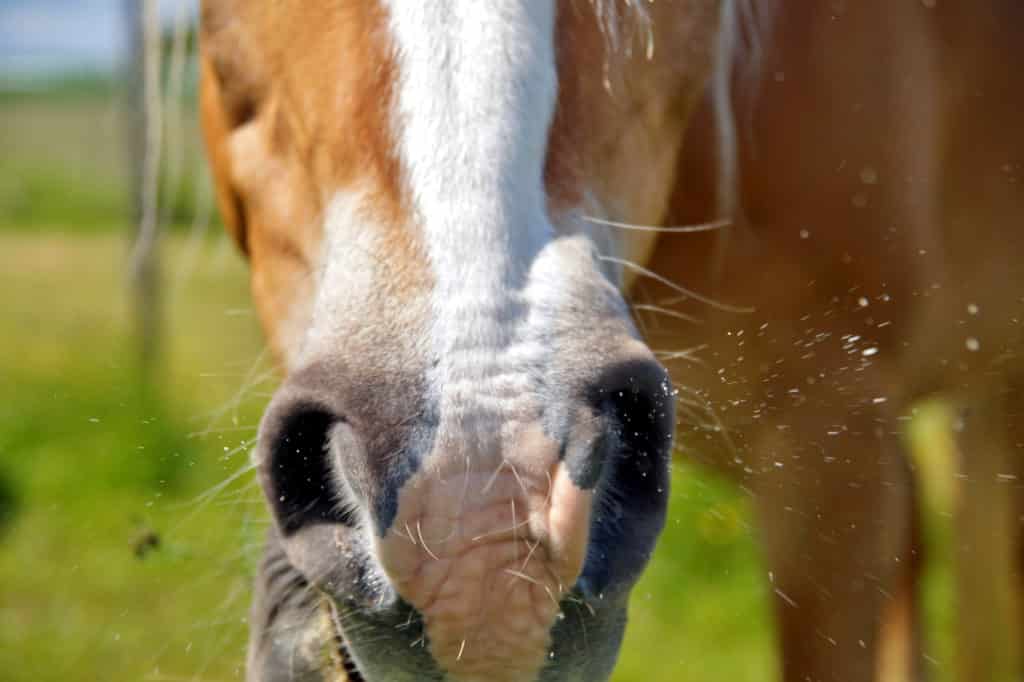Equine Health, Equine Lifestyle
Equine Flu: Symptoms, Treatment & Vaccines
Equine influenza is a highly contagious respiratory disease that affects members of the Equidae family (horses, donkeys, and zebras). It can rapidly spread through unvaccinated horses, which is why it’s extremely important to complete the initial vaccine programme and stay up to date with yearly boosters. On the upside, equine flu is generally not a long-term illness and is rarely fatal, but it can make horses more vulnerable to secondary infections, especially if they’re very young or old.
Keep reading to learn all you need to know about equine flu including how it’s spread, the equine flu symptoms to look out for and the current treatment methods.
How is equine flu spread?
Equine flu is an airborne virus, and it can be spread when an infected horse coughs or sneezes and the droplets get released into the air and are then inhaled by a non-infected horse. It can also be spread via direct horse-to-horse contact, people, shared tack, food bowls and yard equipment.
Equine flu symptoms
Symptoms of equine flu will typically develop a few days after exposure, here’s what to look out for:
• Nasal discharge (over a period of four to five days consistency may change from thin to thick)
• Dry, hacking cough
• Fever up to 41°c
• Lack of appetite
• Lethargy
• Swollen or painful glands under and around their jaw
Unvaccinated horses who have never been exposed to equine flu before will generally show more signs, whereas vaccinated horses may only display mild symptoms or none at all.
Equine flu can also weaken your horse’s immune system and make them more vulnerable to secondary infections such as bronchitis and pneumonia, the risk is greater in youngsters and seniors.
Equine flu treatment
If you suspect your horse has equine flu, contact your vet right away. In order to diagnose the cause of your horse’s illness, they’ll likely take a swab and maybe a blood test for examination.
Much like with humans, there’s no direct treatment for equine flu, but you’ll need to carry out supportive care and ensure your horse is getting plenty of undisturbed box rest. During your horse’s recuperation period, it’s a good idea to make their environment as dust free as possible to ensure their respiratory system isn’t further compromised. Soak hay for ten minutes prior to feeding or switch to haylage and change bedding to dust extracted shavings or something similar. Your vet will also likely recommend quarantining the infected horse and carrying out strict hygiene measures on the yard to minimise the risk of it spreading to other healthy horses.
Recovery will generally take a few weeks, but it may take even longer for them to return to full health. Before returning your horse to work, always consult your vet, as exercising them too heavily before they’ve fully recovered can cause stress and further complications.
Equine flu vaccination schedule
The most serious symptoms of equine flu can be prevented by keeping up to date with their routine vaccinations, as this will protect against the most common strains.
Your horse’s equine flu vaccination schedule will begin with a series of injections over the first year, followed by a continued yearly booster to ensure maximum protection against the virus. You’ll need to keep these up to date each year and carefully schedule in your appointments as being just a day late will result in the vaccine’s validity lapsing and you having to restart the initial equine flu vaccination schedule.
It’s important to note that equine flu is an adaptive virus and can change over time which means it can be difficult for vaccines to stay up to date against the most current strain. With this in mind, vaccines may not provide full immunity and there have been some cases where vaccinated horses can still fall ill, but these equines generally suffer from reduced symptoms and a shorter period of illness to unvaccinated horses.
Vaccines are recorded in your horse’s passport on the relevant pages, so you’ll need to take this to each appointment. Additionally, you’ll likely have to take your passport with you to shows and events too as vaccination checks may be in place. Up to date vaccinations are compulsory if you’re going to be competing with your horse at any level, and some venue hire locations will also require proof of vaccine too.
Now you know all about equine flu and the importance of getting your horse vaccinated. Looking for more advice on caring for your horse? Learn what rain scald is, next.


